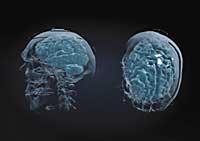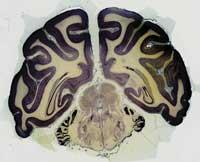The evolution of the human brain is very special
2005/02/01 Elhuyar Zientzia Iturria: Elhuyar aldizkaria
Genes that control the size and complexity of the brain have evolved much faster in the human species than in other species. At least the researchers of the Howard Hughes Institute have reached this conclusion.
It seems that the speed of evolution in humans is due to selection. Human ancestors had a great advantage in having a large and complex brain, so those with a large brain had more descendants than others. Therefore, mutations of genes that made the brain larger and more complex spread very quickly. This ended up causing human beings to evolve much faster than in other species the genes that control the size and complexity of the brain.

Research has focused on 214 genres related to brain development and function. They have measured the speed at which sequences of these genes are modified in four species: human, macaque, rat and mouse. Thus, they have seen that in the first two they have evolved faster than in rodents. In addition, in the human branch these changes have been much more frequent.
On the other hand, it has been proven in which gene the most changes have occurred. And, as expected, they have occurred in the embryonic and fetal phases and in the genes that control brain development during childhood.
Researchers have taken another step and have shown that, in addition to the 214 genes analyzed, other genes have participated in the evolution of the human brain. And no wonder, because it is a really complex organ!
However, researchers who have done this work still have many outstanding questions. According to them, their biological research should be complemented with that of the human sciences. In fact, it would be interesting to know the influence of the social structure of human ancestors and cultural activities on brain evolution.

Gai honi buruzko eduki gehiago
Elhuyarrek garatutako teknologia




